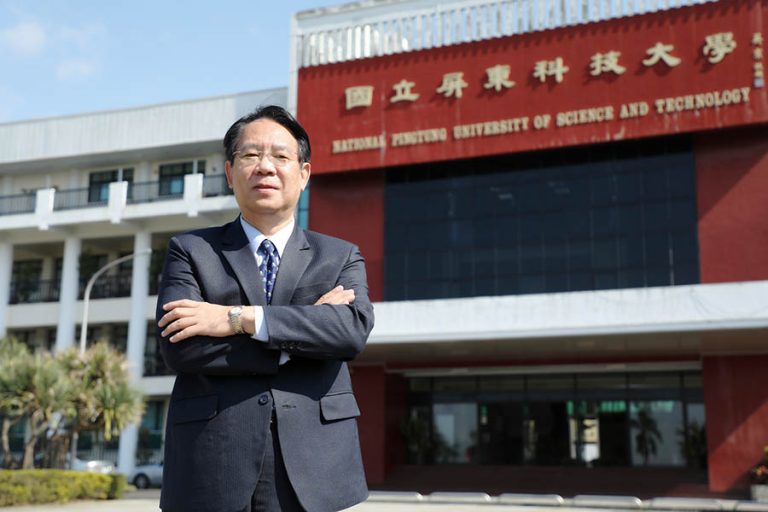National Pingtung University of Science and Technology (NPUST) is characterized by pragmatism. In face of the challenges that higher education is currently presented with, such as declining birthrates, NPUST’s president, Chin-Lung Chang, believes the affects will go beyond universities and industry will also experience a profound impact. Consequently, the aim is to cultivate students with interdisciplinary abilities so they can help fill the gaps that businesses will face. But what exactly does ‘interdisciplinary’ come down to? Chang believes that, in addition acquiring a diverse set of professional skills, attention should be given to language and communication, international mobility, and the ability to cooperate with others. Students should strengthen their professional skills; but also have empathy.
As the declining birth rate makes it difficult for the corporate world to find talent, Chang believes the school should help students go beyond their study majors, by cultivating humanistic qualities and allowing them to explore their own lives.
“If students have good understandings of arts and aesthetics, they will have room for unlimited imaginations; and at least they will be able to follow good and honest pathways.” And so, even though the goal of NPUST is to equip students to find employment immediately after graduation—and prepare them further through corporate internships—Chang also hopes that students will develop senses of humanistic care and empathy.
“If companies ignore humanistic considerations, they may have a negative impact on society.” By way of example, Chang pointed out that some companies want to make quick profits, and so they spray large amounts of pesticides on crops to obtain high output value. But in doing so, the health of consumers can be affected and it may also cause environmental pollution.
On the other hand, Chang is a little worried that, because the current environment is diverse and free, and since students will have many job opportunities to choose in the future, they may be confused by the abundance of choices. While in school, he hopes that the students will be able to develop ideas about their directions in life. That way, when they are making their future career choices, they will have a better understanding of what they are going for. For instance, right now everyone might be thinking about catching the tech industry wave—because of the high salaries. “We have heard the opinions from traditional industry. If everyone crowds into semiconductors, there will be a crowding out effect, resulting in shortages of people in those traditional sectors. Every industry is very important, and everyone cannot aim for the same specific industry.”
When it comes to the question of ‘how’ to train students to have interdisciplinary abilities? Chang explained that education must cover technology, programming, language skills, international mobility, and the ability to make friends. When coming to university, the first goal is to learn about professional technology, and get involved in cross-disciplinary learning. But students also need to make friends.
“Universities are small versions of society. After leaving your hometown, you will be meeting students from different regions or even different countries. It is an adventure and a chance to make many friends.” Chang said that getting to know more people is helpful for cultivating one’s own personality. If you meet like-minded people, you will also have opportunities to start businesses together in the future.
Chang believes that the student societies at NPUST should be transformed. In the past, people have been getting together based on things they were interested in. In the future, he hopes that the student societies will be more than gatherings of like-minded people, but serve as bases for entrepreneurial activity. “More than just focusing on entertainment or intellectual thought, people from different departments can get together to think about ways in which their technologies can be combined and whether they can start a business together.”
Of course, this kind of entrepreneurial spirit, involves an interdisciplinary element.
NPUST has agriculture-related departments at its core, “but they often create very good production technology and products, even if they don’t know how to market them. Therefore, those in agriculture have to learn packaging, because this takes into consideration ways to attract people to purchase your produces. “
Chang raised another an example. Today, you plant something and it grows very well; planting, of course, usually depends on manpower—but can it be replaced by machines? “In the past, farmers sprayed pesticides by themselves. Can they instead use machines in the future?” People in agriculture can consult with people in machinery and mechanics to see about creating robots for spraying pesticides in the fields.
“Micro-credit” courses makes it easier to move across domains
In order to meet certain interdisciplinary needs, NPUST has designed “micro-credit” courses. By just spending a few hours, students can take part in preliminary cross-domain course learning, “such as learning about electromechanical integration, robotic arms operations, industrial wiring, or how to operate drones”. It also allows different colleges to open up credit recognition from different departments and makes it easier for students to achieve interdisciplinary learning.
In response to the declining birthrate, NPUST also requires students, as much as possible, to have the ability to write programs. “In the future, manpower will be less and less, and machines will be used instead—so let the machines help you work. As for ‘how’ to let machines help you work? That’s done through programming languages”. Chang also hopes that students can be international. And to achieve this, the first requirement is to understand English. NPUST has more than 500 foreign students enrolled in its programs and it offers a number of English-taught courses. Most of the participating students are foreigners, but domestic students can also participate in the experience. In order to face the challenge that declining birth rates will bring in the future, NPUST hopes that students will acquire five major abilities, so that they can work across different fields and help industries cope with the worker shortages that they will face.
Original source:Global Views Monthly (遠見雜誌-屏科大校長張金龍:學校社團變創業基地,育成世界級人才) https://www.gvm.com.tw/article/100016
Photo courtesy of Global Views Monthly (遠見雜誌)

